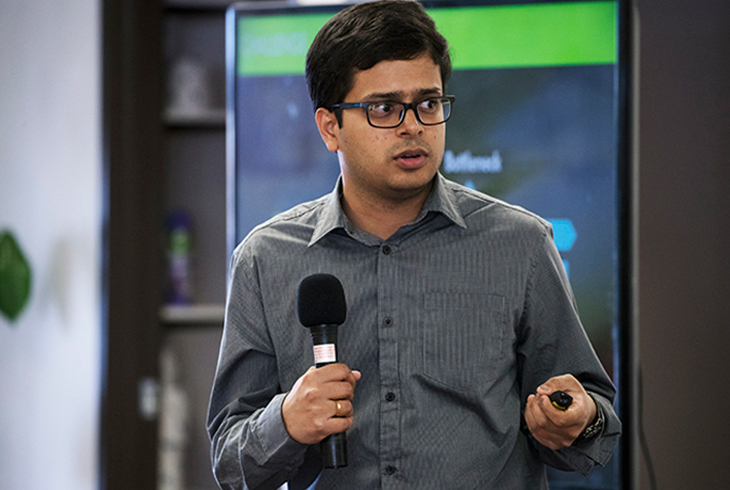First class of Entrepreneurial Postdoc Fellows graduates

Entrepreneurial Postdoc Fellow Maruti Mudunuru presents his final pitch at the closing ceremony that marked the end of a six-month fellowship.
CONTACT
- Richard P. Feynman Center For Innovation
- (505) 665-9090
Four inventors complete fellowship program
The first class of Entrepreneurial Postdoc Fellows presented final pitches at a closing ceremony April 10, which marked the end of their six-month fellowship. Technical mentors, Lab management and investment mentors were present to cheer on the graduates.
"In their presentations, each of the fellows demonstrated a tremendous growth in their ability to connect with an audience," said Chief Technology Officer Duncan McBranch. "In just six months, they developed a sophisticated understanding of how their technology can change the world, what funds or partnerships are needed to advance to the next level and how to get sponsors and collaborators interested in helping them succeed. The program is training them to be more effective as scientists, as entrepreneurs and as ambassadors for the unique and important research at Los Alamos."
Now Vamshi Chillara, Jessica Kubicek-Sutherland, Anand Kumar and Maruti Mudunuru will steer their technology along a charted path, empowered to get their research out of the laboratory and into the hands of people who need it.
The six-month pilot program — a joint initiative of the University of California and Los Alamos — is designed to help early career scientists think about their technologies from a commercial perspective and bring them to the marketplace faster.
The Lab selects Entrepreneurial Fellows based on the potential for their projects to have both scientific and commercial impact. They receive six months of targeted training and mentoring from experienced investment mentors, as well as funding to pursue market exploration and technology application.
"This fellowship is so unique — I learned and gained a lot in a short period of timespan," said Mudunuru. "It helped with technical aspects, communications skills, talking skills, business skills and making new collaborations. It is everything in one package and rare to find such a fellowship with an awesome mentoring experience."
Kumar concurred. "The Fellowship exceeded my expectations," he explained. "It helped boost my confidence in communicating with a broad audience, improved my ability to clearly narrate complex technical information using simple language, and show me how to communicate between science and business worlds. It also allowed me the opportunity to network and establish collaborations. And during the fellowship, I learned that multiple career options exist after completing a postdoc."
Prepared to charge ahead
Through this intensive program, these four fellows have focused on customer discovery and have talked to 100-plus businesses, government and research organizations to gain an understanding of who is interested in their innovations.
"I was able to make new collaborations within and outside EES (such as with Paul Johnson's team in EES-17 and Dipen Sinha's team in MPA-11 — both Johnson and Sinha are Lab Fellows), and improve my business and networking skills," said Mudunuru. "It also helped me understand the market for my EDGEip software product."
In March, the fellows presented their pitches to the New Mexico Angels, the state’s leading angel investing group.
"My investment mentor, Tom Stephenson, provided exceptional support to me during this program," said Kubicek-Sutherland. "It was very useful to have someone telling us what investors would ask about our specific technology so we could find the answers. To our surprise, most of it had nothing to do with the science."
With guidance from the Richard P. Feynman Center for Innovation, the fellows gained insight into the process of positioning their innovations for commercial collaboration and market adoption. They learned how to access more funding options, expand their networks and broaden their career opportunities.
"Many postdocs have no clue about career options other than entering the already over-crowded academic world," noted Kumar. "Industry options can look lucrative, and if you have gone through this program, your application stands out as unique among the thousands of regular postdoc applicants because you have entrepreneurial skills. These skills also can give you confidence that rather than working for others, you can be the owner of yourself and your destiny by choosing the startup route."
Upcoming 2018 class of postdocs
In January, a second class of postdocs was selected to start Phase One of the Entrepreneurial Postdoc Pilot.
They include Laura Lilley (C-IIAC), Yuxiang Chen (MPA-CINT), Emilia Solomon(B-10), Kannan Ramaiyan (MPA-11), Karla Erickson (C-IIAC), Ross Beattie (C-IIAC), David Baumann (B-11), Phong Nguyen (EES-14) and Christian Andresen(EES-14).
These postdocs will present at DisrupTECH in July, where four to five of them will advance to the Entrepreneurial Fellowship Program, which is scheduled to begin in October and run through April of 2019.
Kubicek-Sutherland offered this advice to the upcoming class: "Start doing market research right away. As scientists we have a narrow focus on our particular field. Get out there and talk to people about how they would use your technology or what features are most important. This will give you tremendous insight into what is useful and feasible, and then you can adjust so that you are solving an actual problem in the 'real world.'"

Vamshi Chillara (Materials Synthesis and Integrated Devices, MPA-11) is developing a technology that would power implants using ultrasound, thus providing wireless energy delivery for biomedical applications.

Jessica Kubicek-Sutherland (Physical Chemistry and Applied Spectroscopy, C-PCS) is developing a RAPID Sepsis Sensor for the detection of bacterial sepsis in minutes using only a drop of blood.

Anand Kumar (Biosecurity and Public Health, B-10) is developing DIF-FIX, a pill for patients who are at high risk for Clostridium difficile, a bacterium that causes diarrhea and serious intestinal conditions like colitis. This noninvasive treatment is cheaper and safer than a fecal transplant and is based on a new platform that characterizes microbial interactions in the gut.

Maruti Mudunuru (Computational Earth Science, EES-16) is developing EDGEip, a data analytics software platform, to turn terabytes of data collected by oil and gas well sensors into actionable information for use in real-time.





